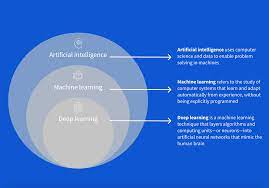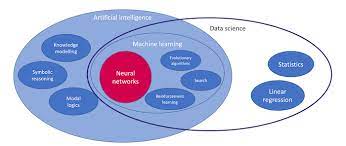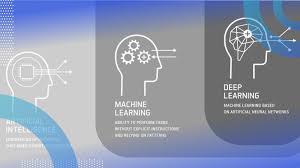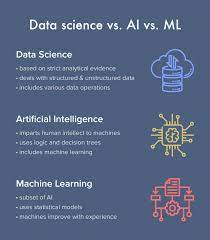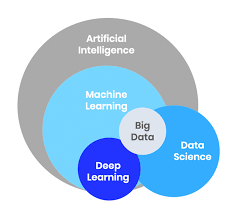AI and Deep Learning: Transforming the Future
Artificial Intelligence (AI) and deep learning are at the forefront of technological innovation, revolutionising industries and reshaping the way we interact with technology. From healthcare to finance, these advanced technologies are driving significant changes and opening up new possibilities.
Understanding AI and Deep Learning
AI refers to the simulation of human intelligence in machines that are programmed to think like humans and mimic their actions. It encompasses a wide range of capabilities, from simple automation to complex problem-solving. Deep learning, a subset of machine learning, involves neural networks with three or more layers. These neural networks attempt to simulate the behaviour of the human brain, allowing computers to learn from large amounts of data.
The Impact on Various Industries
The impact of AI and deep learning is evident across numerous sectors:
- Healthcare: AI algorithms can analyse medical images with remarkable accuracy, aiding in early diagnosis and treatment planning. Deep learning models help in predicting patient outcomes and personalising medicine.
- Finance: AI is used for fraud detection, risk management, and algorithmic trading. Deep learning enhances predictive analytics, providing insights into market trends.
- Automotive: Autonomous vehicles rely heavily on deep learning for object detection, path planning, and decision-making processes.
- Retail: Personalised recommendations powered by AI improve customer experience while optimising inventory management through predictive analytics.
The Challenges Ahead
While AI and deep learning offer immense potential, they also present challenges. Data privacy concerns arise as these technologies require vast amounts of data to function effectively. Additionally, there is a need for transparency in AI decision-making processes to ensure ethical use.
The Future of AI and Deep Learning
The future holds exciting prospects for AI and deep learning as advancements continue at a rapid pace. Researchers are exploring ways to make these technologies more efficient by reducing computational requirements while increasing accuracy. The integration of quantum computing could further accelerate developments in this field.
As we move forward into an era where intelligent systems become an integral part of our daily lives, it is crucial that society addresses ethical considerations alongside technological progress. By doing so responsibly, we can harness the full potential of AI and deep learning for the betterment of humanity.
Conclusion
The transformative power of AI and deep learning is undeniable. With continued research and development combined with responsible implementation practices across industries worldwide—these technologies have the capacity not only transform businesses but also improve quality-of-life globally through innovative solutions tailored specifically towards addressing complex challenges faced today!
Essential Tips for Mastering AI and Deep Learning: From Foundations to Ethical Considerations
- Start with the basics of machine learning before diving into deep learning.
- Understand the mathematical concepts behind neural networks and deep learning algorithms.
- Experiment with different neural network architectures to see what works best for your specific problem.
- Regularly update your knowledge as AI and deep learning technologies evolve rapidly.
- Data quality is crucial – ensure you have clean, relevant data for training your models.
- Consider ethical implications and biases when developing AI systems.
Start with the basics of machine learning before diving into deep learning.
Before delving into the complexities of deep learning, it is crucial to first grasp the fundamentals of machine learning. Understanding basic concepts such as supervised and unsupervised learning, data preprocessing, and model evaluation provides a solid foundation upon which more advanced topics can be built. Familiarity with these core principles allows individuals to appreciate the nuances of deep learning architectures, such as neural networks, and comprehend how they extend traditional machine learning techniques. By starting with the basics, learners can develop a comprehensive understanding that will enable them to tackle more intricate deep learning challenges effectively.
Understand the mathematical concepts behind neural networks and deep learning algorithms.
Understanding the mathematical concepts behind neural networks and deep learning algorithms is essential for anyone looking to delve deeper into the field of artificial intelligence. These mathematical foundations, including linear algebra, calculus, probability, and statistics, form the backbone of how neural networks operate. By grasping these concepts, one can better comprehend how data is processed through layers of neurons, how weights are adjusted during training to minimise errors, and how different architectures can affect performance. This knowledge not only enhances one’s ability to design and optimise deep learning models but also aids in troubleshooting and refining algorithms for improved accuracy and efficiency. Moreover, a solid mathematical understanding enables practitioners to innovate beyond existing frameworks, contributing to advancements in AI technology.
Experiment with different neural network architectures to see what works best for your specific problem.
Experimenting with different neural network architectures is crucial when working with AI and deep learning, as it allows for the optimisation of model performance tailored to specific problems. Each problem may require a unique approach due to variations in data characteristics and desired outcomes. By testing various architectures, such as convolutional neural networks (CNNs) for image-related tasks or recurrent neural networks (RNNs) for sequential data, one can identify the most effective structure that enhances accuracy and efficiency. This iterative process of experimentation not only improves model performance but also provides valuable insights into the underlying data patterns, ultimately leading to more robust and reliable AI solutions.
Regularly update your knowledge as AI and deep learning technologies evolve rapidly.
In the rapidly evolving field of AI and deep learning, staying informed about the latest advancements is crucial for maintaining a competitive edge. Technologies and methodologies are continuously being developed and refined, leading to breakthroughs that can significantly impact various industries. Regularly updating your knowledge ensures that you remain adept at leveraging these innovations effectively. By engaging with current research papers, attending relevant conferences, and participating in professional networks, you can keep abreast of new tools, techniques, and best practices. This proactive approach not only enhances your skills but also enables you to anticipate future trends and adapt strategies accordingly, ensuring continued success in this dynamic landscape.
Data quality is crucial – ensure you have clean, relevant data for training your models.
In the realm of AI and deep learning, the quality of data used for training models is paramount. Clean, relevant data serves as the foundation for developing accurate and reliable models. Poor-quality data can lead to misleading results and undermine the effectiveness of AI applications. Ensuring that data is free from errors, inconsistencies, and irrelevant information is essential for optimising model performance. By investing time in data cleansing and validation processes, organisations can enhance the predictive power of their AI systems and achieve more meaningful insights. Ultimately, high-quality data not only improves model accuracy but also builds trust in AI-driven decisions.
Consider ethical implications and biases when developing AI systems.
When developing AI systems, it is crucial to consider the ethical implications and potential biases that may arise. AI technologies have the power to significantly influence decision-making processes and societal norms, making it essential to ensure they operate fairly and transparently. Biases in AI can stem from the data used to train models, reflecting existing prejudices or imbalances present in society. If not addressed, these biases can lead to unfair outcomes or discrimination against certain groups. Therefore, developers must implement rigorous testing and validation procedures to identify and mitigate any biases within their systems. Additionally, engaging with diverse stakeholders during the development process can provide valuable perspectives and help create more equitable AI solutions. Prioritising ethics in AI development not only enhances trust but also ensures that these technologies contribute positively to society as a whole.


